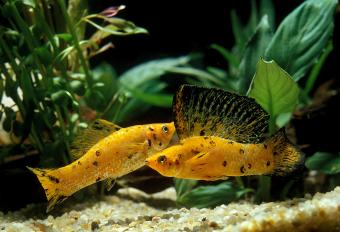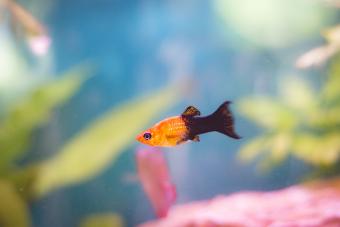
Aquarists often think of bettas as beginner fish, and while they aren't the most difficult species to keep, their care requirements are often misunderstood. Bettas are not "easy" to keep, and you still have to give them a healthy environment to live in and a good diet to help them defy the odds and live well past their average lifespan. Your betta's lifespan depends on many factors, including their tank size, water conditions, diet, and genetics. Give your betta the longest and happiest life possible by following these tips.
How Long Do Betta Fish Live?
Most betta fish live to between 2 and 5 years. However, Betta splendens, the species most commonly sold as bettas in aquarium stores, are heavily line-bred (meaning that closely related fish are bred together) to create all the cool color and fin varieties people love. While this produces some stunningly beautiful fish, it isn't good for the overall lifespan or health of the species.
When you purchase a betta from a pet store, they will usually be around six months old, which means you can enjoy another one-and-a-half to four-and-a-half or more years together. Stories of bettas reaching an impressive 15 years of age are sometimes reported in fish forums, but nobody has verified that info. You can give your betta the best chance at a long and healthy life by caring for them properly.
Factors That Affect Betta Lifespan
How long a captive betta will live depends on several factors. You do have control over many of these, including their diet and environment, but some are related to their genetics.
Environment
A betta's habitat is one of the most important pieces of their care. Many people believe bettas can live happily in a small fishbowl, but this isn't the case. Keeping your betta in a small space will shorten their life. These fish must be kept in a tank that is at least 5 gallons in volume or larger. A 10-gallon tank is optimal. Other ways you can extend your betta's life through their environment include the following:
- Make sure your betta tank is longer rather than taller to mimic their natural environment.
- Have a secure lid on the tank to prevent your betta from jumping out.
- Do not house male bettas together or they will fight, becoming stressed and potentially killing one another.
- Maintain a water temperature between 75- and 80-degrees Fahrenheit by installing an aquatic water heater within the tank.
- Use an aquarium filtration system to keep their water clean and free of nitrates and ammonia.
- Keep the water within ideal parameters with regular testing and water changes of at least 25% of tank water once weekly.
- Consider enrichment tools like live aquatic plants, hollow décor for hiding, or a floating betta mirror.
Proper husbandry is huge when it comes to helping bettas reach a ripe old age. Do not keep your betta in a fish bowl or vase and expect them to live a long life. A large, planted aquarium, with lots of places to hide, few tank mates, and consistent feeding and care, will produce the best results. Just don't leave any mirrors in or near the tank all the time, or your male betta will become stressed. He thinks his reflection is a rival betta, which is why he's displaying and swimming around aggressively.
Bonus Tip: Enrichment is important for your betta's mental and physical health. You can find betta toys online or at your local pet store, including hammocks, floating mirrors, moss balls, and more. Just make sure the toy is designed for bettas before giving it to your fishy friend.
Diet
Betta fish are omnivores, so they have to eat a plant- and animal-based diet in order to thrive. Without the right nutrients, your betta could develop diseases that will shorten their life. Feed them a diet formulated especially for betta fish.
You could also consider giving them the occasional bloodworm or thawed brine shrimp as a fun and tasty way to give them the nutrients they need. Always buy live food from a reputable pet store to reduce the risk of introducing harmful parasites into your betta's tank. Frozen food supplement options are increasingly popular, because they do not carry parasites, and improve the overall health of aquarium fish.
Genetics
A betta's genetics play a large role in their overall health. Inbreeding can perpetuate genetic diseases or make fish that are less hardy than other lines. Some of the betta breeds with shorter lifespans are the feather tail, rose tail, and marbled betta due to their selective breeding.
Buy your betta from a reputable breeder or pet store and take a close look at the fish before bringing them home. Make sure they have clear eyes, bright scales, and no cuts, scrapes, or lumps on their body. If you focus on how healthy they look, you should be able to help ensure you pick up a fish with the potential to live a long, healthy life.
Veil tails, which are the variety most commonly found at pet stores, are thought to be the healthiest and longest-lived betta variety.
Set Your Betta Up for Success
Betta fish are one of the most low-maintenance pets out there, but that doesn't mean they can thrive with no care at all. With a spacious, clean tank, a nutritious diet, and enrichment activities, your pretty betta can live for many happy years.







